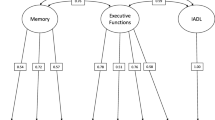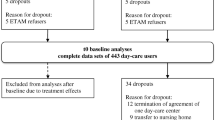Abstract
Introduction
The performance of activities of daily living in elderly patients with memory disorders is directly related to living independently and to autonomy. Documenting and assessing functional capacity through detailed scales is important for both diagnostic and treatment recommendations. The Everyday Cognition (ECog) scale is a relatively new informant-rated measure of cognitive and functional abilities. In the present study, the discriminant validity of the ECog scale was evaluated in cognitively intact controls (CN) and in patients with mild cognitive impairment (MCI) and mild Alzheimer’s disease (AD) from the Argentina-ADNI cohort to establish diagnostic accuracy. In addition, we compared the sensitivity and specificity of ECog against Functional Assessment Questionnaire (FAQ) scale to discriminate among the three groups.
Methods
We evaluated 15 CN, 28 MCI, and 13 mild AD subjects. External, convergent and divergent validity and internal consistency were examined.
Results
The average total score on the ECog was significantly different across the three diagnostic syndromes (p < .05). The ECog was more sensitive than FAQ in discriminating between CN and MCI patients and between MCI and AD subjects. The ECog showed a strong correlation with FAQ, and moderate correlations with neuropsychological tests. Cronbach’s alpha was .98.
Conclusions
The ECog scale is an efficient instrument for the differentiation of individuals with mild dementia or MCI from normal older adults, with good accuracy and good correlation with other tests measuring daily and cognitive functions. Comparing against FAQ, ECog was more useful in assessing changes in functionality in MCI patients.




Similar content being viewed by others
References
Albert MS, DeKosky ST, Dickson D et al (2011) The diagnosis of mild cognitive impairment due to Alzheimer’s disease: recommendations from the National Institute on Aging-Alzheimer’s Association workgroups on diagnostic guidelines for Alzheimer’s disease. Alzheimers Dement 7:270–279. https://doi.org/10.1016/j.jalz.2011.03.008
McKhann GM, Knopman DS, Chertkow H et al (2011) The diagnosis of dementia due to Alzheimer’s disease: recommendations from the National Institute on Aging-Alzheimer’s Association workgroups on diagnostic guidelines for Alzheimer’s disease. Alzheimers Dement 7:263–269. https://doi.org/10.1016/j.jalz.2011.03.005
Petersen RC (2004) Mild cognitive impairment as a diagnostic entity. J Intern Med 256:183–194
Winblad B, Palmer K, Kivipelto M, et al (2004) Mild cognitive impairment—beyond controversies, towards a consensus: report of the International Working Group on mild cognitive impairment. J Intern Med 256:240–246
Liu-Seifert H, Siemers E, Price K, et al (2015) Cognitive impairment precedes and predicts functional impairment in mild Alzheimer’s disease. J Alzheimers Dis 47:205–214. https://doi.org/10.3233/JAD-142508
Thomas KR, Marsiske M 2014 Verbal prompting to improve everyday cognition in MCI and unimpaired older adults. Neuropsychology 28:123–134. https://doi.org/10.1037/neu0000039
Gold DA (2012) An examination of instrumental activities of daily living assessment in older adults and mild cognitive impairment. J Clin Exp Neuropsychol 34:11–34. https://doi.org/10.1080/13803395.2011.614598
Mahoney FI, Barthel DW (1986) Functional evaluation: the Barthel index. Md State Med J 14:61–65
Sheehan B 2012 Assessment scales in dementia. Ther Adv Neurol Disord 5:349–358. https://doi.org/10.1177/1756285612455733
Lawton MP, Brody EM (1969) Assessment of older people: self-maintaining and instrumental activities of daily living. Gerontologist 9:179–186
Pfeffer RI, Kurosaki TT, Harrah CH Jr et al (1982) Measurement of functional activities in older adults in the community. J Gerontol 37:323–329
Weintraub S, Salmon D, Mercaldo N et al (2009) The Alzheimer’s disease centers’ uniform data set (UDS): the neuropsychologic test battery. Alzheimer Dis Assoc Disord 23:91–101. https://doi.org/10.1097/WAD.0b013e318191c7dd
Teng E, Becker BW, Woo E et al (2010) Utility of the Functional Activities Questionnaire for distinguishing mild cognitive impairment from very mild Alzheimer disease. Alzheimer Dis Assoc Disord 24:348–353. https://doi.org/10.1097/WAD.0b013e3181e2fc84
Blessed G, Tomlinson BE, Roth M (1968) The association between quantitative measures of dementia and of senile change in the cerebral grey matter of elderly subjects. Br J Psychiatry 114:797–811
Gélinas I, Gauthier L, McIntyre M et al (1999) Development of a functional measure for persons with Alzheimer’s disease: the disability assessment for dementia. Am J Occup Ther 53:471–481
Hindmarch I, Lehfeld H, de Jongh P et al (1998) The Bayer activities of daily living scale (B-ADL). Dement Geriatr Cogn Disord 9:20–26
Farias ST, Mungas D, Reed BR, et al (2008) The measurement of everyday cognition (ECog): scale development and psychometric properties. Neuropsychology 22:531–544. https://doi.org/10.1037/0894-4105.22.4.531
Tomaszewski Farias S, Mungas D, Harvey DJ et al (2011) The measurement of everyday cognition: development and validation of a short form of the Everyday Cognition scales. Alzheimers Dement 7:593–601. https://doi.org/10.1016/j.jalz.2011.02.007
Russo MJ, Gustafson D, Vázquez S, et al (2014) Creation of the Argentina-Alzheimer’s disease neuroimaging initiative. Alzheimers Dement 10:S84-7
Weiner MW, Aisen PS, Jack CR Jr, et al (2010) The Alzheimer’s disease neuroimaging initiative: progress report and future plans. Alzheimers Dement 6:202–211.e7. https://doi.org/10.1016/j.jalz.2010.03.007
Petersen RC, Aisen PS, Beckett LA, et al (2010) Alzheimer’s disease neuroimaging initiative (ADNI): clinical characterization. Neurology 74:201–209. https://doi.org/10.1212/WNL.0b013e3181cb3e25
McKhann G, Drachman D, Folstein M et al (1984) Clinical diagnosis of Alzheimer’s disease: report of the NINCDS-ADRDA Work Group under the auspices of Department of Health and Human Services Task Force on Alzheimer’s Disease. Neurology 34:939–944
Thomas KR, Edmonds EC, Delano-Wood L et al (2017) Longitudinal trajectories of informant-reported daily functioning in empirically defined subtypes of mild cognitive impairment. J Int Neuropsychol Soc 23:521–527. https://doi.org/10.1017/S1355617717000285
Marshall GA, Zoller AS, Kelly KE, et al (2014) Everyday cognition scale items that best discriminate between and predict progression from clinically normal to mild cognitive impairment. Curr Alzheimer Res 11:853–861
Farias ST, Park LQ, Harvey DJ et al (2013) Everyday cognition in older adults: associations with neuropsychological performance and structural brain imaging. J Int Neuropsychol Soc 19:430–441. https://doi.org/10.1017/S1355617712001609
Hsu JL, Hsu WC, Chang CC et al (2017) Everyday cognition scales are related to cognitive function in the early stage of probable Alzheimer’s disease and FDG-PET findings. Sci Rep 11:1719. https://doi.org/10.1038/s41598-017-01193-6 7) .
Ahn IS, Kim JH, Kim S et al (2009) Impairment of instrumental activities of daily living in patients with mild cognitive impairment. Psychiatry Investig 6:180–184. https://doi.org/10.4306/pi.2009.6.3.180
Cornelis E, Gorus E, Beyer I et al (2017) Early diagnosis of mild cognitive impairment and mild dementia through basic and instrumental activities of daily living: development of a new evaluation tool. PLoS Med 14:e1002250. https://doi.org/10.1371/journal.pmed.1002250
De Vriendt P, Mets T, Petrovic M et al (2015) Discriminative power of the advanced activities of daily living (a-ADL) tool in the diagnosis of mild cognitive impairment in an older population. Int Psychogeriatr 27:1419–1427. https://doi.org/10.1017/S1041610215000563
Farias ST, Mungas D, Reed BR et al (2006) MCI is associated with deficits in everyday functioning. Alzheimer Dis Assoc Disord 20:217–223
Perneczky R, Pohl C, Sorg C et al (2006) Complex activities of daily living in mild cognitive impairment: conceptual and diagnostic issues. Age Ageing 35:240–245
Perneczky R, Pohl C, Sorg C et al (2006) Impairment of activities of daily living requiring memory or complex reasoning as part of the MCI syndrome. Int J Geriatr Psychiatry 21:158–162
Aretouli E, Brandt J (2010) Everyday functioning in mild cognitive impairment and its relationship with executive cognition. Int J Geriatr Psychiatry 25:224–233. https://doi.org/10.1002/gps.2325
Burton CL, Strauss E, Bunce D et al (2009) Functional abilities in older adults with mild cognitive impairment. Gerontology 55:570–581. https://doi.org/10.1159/000228918
Pérès K, Chrysostome V, Fabrigoule C et al (2006) Restriction in complex activities of daily living in MCI: impact on outcome. Neurology 67:461–466
Reppermund S, Sachdev PS, Crawford J et al (2011) The relationship of neuropsychological function to instrumental activities of daily living in mild cognitive impairment. Int J Geriatr Psychiatry 26:843–52
Rueda AD, Lau KM, Saito N et al (2015) Self-rated and informant-rated everyday function in comparison to objective markers of Alzheimer’s disease. Alzheimers Dement 11:1080–1089. https://doi.org/10.1016/j.jalz.2014.09.002
Sánchez-Benavides G, Manero RM, Quiñones-Ubeda S et al (2009) Spanish version of the Bayer Activities of Daily Living scale in mild cognitive impairment and mild Alzheimer disease: discriminant and concurrent validity. Dement Geriatr Cogn Disord 27:572–578. https://doi.org/10.1159/000228259
Paula JJ, Bertola L, Ávila RT et al (2014) Development, validity, and reliability of the General Activities of Daily Living scale: a multidimensional measure of activities of daily living for older people. Rev Bras Psiquiatr 36:143–152. https://doi.org/10.1590/1516-4446-2012-1003
Acknowledgements
We wish to acknowledge members of the Argentina-Alzheimer’s Disease Neuroimaging Initiative include Horacio Martinetto, Fernando Ventrice, Alejandra Amengual, Silvia Vazquez, Salvador Guinjoan, and Miguel Riudavets.
Author information
Authors and Affiliations
Corresponding author
Ethics declarations
Ethical approval
This study was approved by the Medical Ethics Committee of FLENI, Buenos Aires, Argentina. The research was conducted in accordance with the Declaration of Helsinki (1975).
Informed consent
Written informed consent was obtained from all participants and/or their legally acceptable representative.
Conflict of interest
The author(s) declared no potential conflicts of interest with respect to the authorship and/or publication of this article. This research did not receive any specific grant from funding agencies in the public, commercial, or not-for-profit sectors.
Rights and permissions
About this article
Cite this article
Russo, M.J., Cohen, G., Chrem Mendez, P. et al. Utility of the Spanish version of the Everyday Cognition scale in the diagnosis of mild cognitive impairment and mild dementia in an older cohort from the Argentina-ADNI. Aging Clin Exp Res 30, 1167–1176 (2018). https://doi.org/10.1007/s40520-018-0899-8
Received:
Accepted:
Published:
Issue Date:
DOI: https://doi.org/10.1007/s40520-018-0899-8




